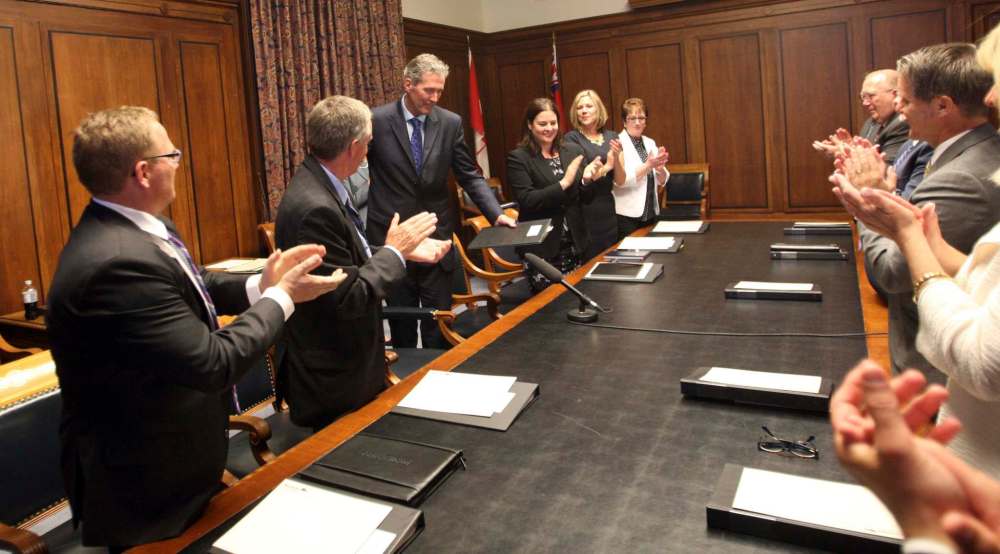Cabinet ministers’ mandate letters outline new government’s priorities
Advertisement
Read this article for free:
or
Already have an account? Log in here »
To continue reading, please subscribe:
Monthly Digital Subscription
$0 for the first 4 weeks*
- Enjoy unlimited reading on winnipegfreepress.com
- Read the E-Edition, our digital replica newspaper
- Access News Break, our award-winning app
- Play interactive puzzles
*No charge for 4 weeks then price increases to the regular rate of $19.00 plus GST every four weeks. Offer available to new and qualified returning subscribers only. Cancel any time.
Monthly Digital Subscription
$4.75/week*
- Enjoy unlimited reading on winnipegfreepress.com
- Read the E-Edition, our digital replica newspaper
- Access News Break, our award-winning app
- Play interactive puzzles
*Billed as $19 plus GST every four weeks. Cancel any time.
To continue reading, please subscribe:
Add Free Press access to your Brandon Sun subscription for only an additional
$1 for the first 4 weeks*
*Your next subscription payment will increase by $1.00 and you will be charged $16.99 plus GST for four weeks. After four weeks, your payment will increase to $23.99 plus GST every four weeks.
Read unlimited articles for free today:
or
Already have an account? Log in here »
Hey there, time traveller!
This article was published 19/05/2016 (3496 days ago), so information in it may no longer be current.
The marching orders for Premier Brian Pallister’s 12 cabinet ministers have been released.
The mandate letters given to the ministers on the day of their swearing-in on May 3 were made public Thursday afternoon. The letters, ranging from three to four pages, encompass the Tories’ campaign pledges as well as offering timelines for some of them to be complete.
For some ministers, the letters offered a detailed description of what Pallister expects them to achieve in their first mandate.

Finance Minister Cameron Friesen has been tasked with rolling back the PSTby 2020, keeping government spending at no more than a three per cent increase annually, and taking steps to balance the budget “over time.”
Giving more powers to the Auditor General is one of Justice Minister Heather Stefanson’s top orders. The letter outlines several new powers to give to the Auditor General, including allowing them to hire auditors independently and review all government advertising.
She will also bring in Manitoba’s first Open Government bill, designed to increase transparency to the government.
Working to fix Manitoba’s health care system will fall on the shoulders of Health, Seniors and Active Living Minister Kelvin Goertzen.
In his letter, he has been instructed to reduce ambulance fees by half beginning in the first year in office. He will also strike up a Wait Time Reduction Task Force, establish a new doctor recruitment and retention program, and fast-track the construction of 1,200 new personal care home beds. No timeline was given, but it also states they will establish a dedicated stroke unit in the province.
Keeping Manitoba Hydro publicly owned is the first marching order for Crown Services Minister Ron Schuler. His letter also states he will review Bipole III construction.
Meanwhile, Infrastructure Minister Blaine Pedersen was given only a handful of tasks which included investing no less than $1 billion a year in infrastructure and making flood protection a top priority.
Indigenous and Municipal Affairs Minister Eileen Clarke was given a detailed letter, calling for to work with municipalities and the City of Winnipeg to establish Pallister’s promised “basket-funding approach” for projects. For the indigenous file, Clark’s tasks are less clear. She is told to establish a “consult framework for respectful and productive consultation with indigenous communities.”
It also lays out how the province will work with the federal government on “enhanced education funding” for students on reserves.
Literacy improvement, a better scholarship program and “empowering teachers” are a few of the tasks of Education Minister Ian Wishart. Wishart’s letter prioritizes several of Pallister’s campaign promises, including an elementary Read to Succeed Program and a promise to work with the private sector to increase scholarship opportunities.
As the Families Minister, Scott Fielding has one of the toughest files in the province. His mandate letter outlines how he will introduce the Protection Children Act, to make it easier for information sharing among the government department, child and family services agencies and law enforcement agencies.
In the area of child care, Fielding has been tasked to increase operating funding for licensed, family child-care home spaces and increase the numbers of child-care centres in schools.
Bringing in an international curling centre is one of the top priorities for Rochelle Squires, Minister of Sport Culture and Heritage. She has also been instructed to conduct a “Manitoba Cultural Funding Model,” which is intended to improve funding for the province’s arts and culture sector.
Growth, Enterprise and Trade Minister Cliff Cullen will hardly have time to stop to breathe: he must increase tourism, steer Manitoba into the New West Partnership with the other western provinces, improve small business venture capital credits, and create the Premier’s Enterprise Team with a membership still to be named of top business leaders.
Sustainable Development Minister Cathy Cox must implement an alternative land use services program to reduce flooding, reconcile the needs of industry and rural and northern communities, consult on the future of land under park reserve status, and work with Ottawa and other jurisdictions to develop a made-in-Manitoba climate action plan.
The agenda for Agriculture Minister Ralph Eichler is quite light. His big task is helping to reduce red tape and ensuring his department adheres to Open Government initiatives.
History
Updated on Thursday, May 19, 2016 6:15 PM CDT: Corrects date letters were received


